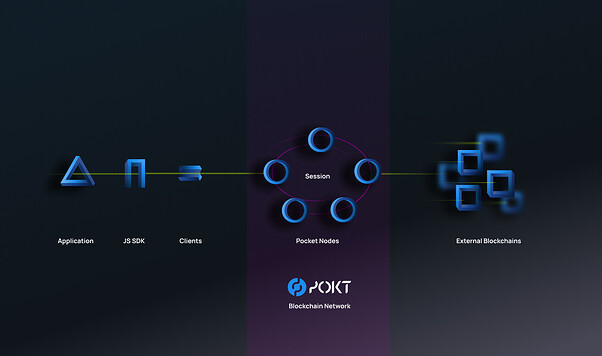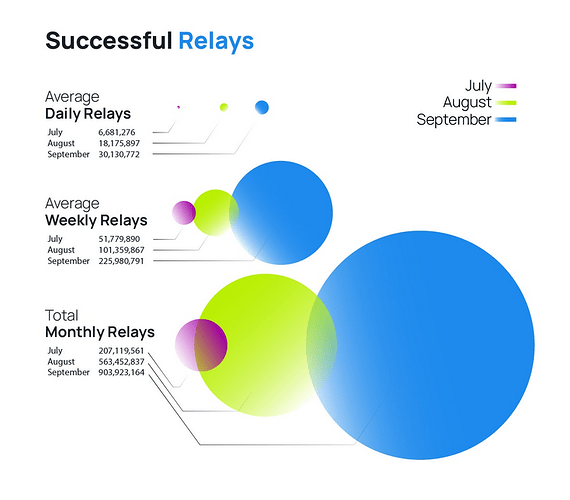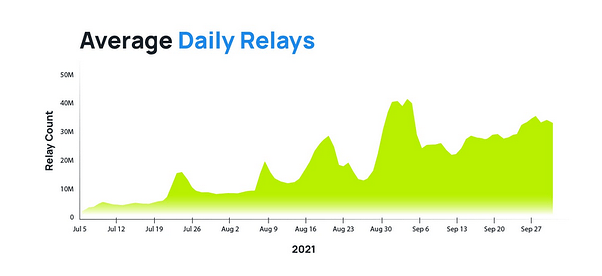[center]Pocket network POKT:[/center]
- RPCs Remote procedure calls calls to a blockchain when you add a new network on your wallet this is the address your adding. “Pocket Network is a decentralized blockchain API built for Web3 apps, relaying data to and from any blockchain through a network of thousands of nodes. The Pocket Network protocol validates all relayed data and proportionally rewards the participating nodes with POKT.”
- Prior to pocket network ethereum had 1 RPC and was unable to decentralise this people used this bottleneck and weak spot to point out that ethereum could never be truly decentralised well here comes pocket network.
- Instead of deploying to a single service provider, paying absurd fees for random outages and leaked data, tap into Pocket’s trustless API protocol and route your requests to 1000’s of independent full nodes. Available for all major blockchain networks.
- Recent pump on harmony one stopped by chain crashing on high volume due to RPC bottleneck a centralised weakness the pocket network has a decentralised solution for distributed RPCs
- Stephanie the ghost step bullish on project (project lead on alchamix network) a coder with serious good rep
- x.com
- 900 million relays processed in september 6,363 validator nodes active already 3.4 billion relays since launch.
- Multichain on eth and now avalanche and branching out with 4,700 nodes adding the avalanche capability on their node. This saved yet another chain RPC failure as avalanches RPC went down pocket networks decentralised RPC’s remained active saving the chain.
- Already active on Solana
What is an RPC? Wiki: “In distributed computing, a remote procedure call (RPC) is when a computer program causes a procedure (subroutine) to execute in a different address space (commonly on another computer on a shared network), which is coded as if it were a normal (local) procedure call, without the programmer explicitly coding the details for the remote interaction. That is, the programmer writes essentially the same code whether the subroutine is local to the executing program, or remote. This is a form of client–server interaction (caller is client, executor is server), typically implemented via a request–response message-passing system. In the object-oriented programming paradigm, RPCs are represented by remote method invocation (RMI). The RPC model implies a level of location transparency, namely that calling procedures are largely the same whether they are local or remote, but usually they are not identical, so local calls can be distinguished from remote calls. Remote calls are usually orders of magnitude slower and less reliable than local calls, so distinguishing them is important.
RPCs are a form of inter-process communication (IPC), in that different processes have different address spaces: if on the same host machine, they have distinct virtual address spaces, even though the physical address space is the same; while if they are on different hosts, the physical address space is different. Many different (often incompatible) technologies have been used to implement the concept.”
Basically when you send a transaction or do something on a blockchain the RPC receives it and send it to the right place to be executed so that going down stops requests going through like token transfers etc. (let me know if i have misinterpreted this I am not a programmer)
[center]Tokenomics:[/center]
The Purpose of POKT:
“POKT is not a transactional cryptocurrency. The Pocket Network blockchain is not meant to have sub-5-second block times, provide 10,000 transactions per second, facilitate direct payments (generally speaking), or act as a smart contract platform. The majority of the transactions occurring will be staking by Applications and Service Nodes, Proof-of-Relay batches by Service Nodes, and block reward payments to Service Nodes for facilitating Relay requests, which all POKT holders will pay for via inflation.” (End users are all automated demand which is good, no conscious decision to purchase required only for programmer to implement the RPC)
“This is in contrast to most layer 1 chains, which will eventually need to rely predominantly on transaction fees. At network maturity, Pocket will become a simple fee market with the demand side (Applications) burning POKT and the supply side (Service Nodes) receiving newly minted POKT via the block reward inflation mechanism. This allows for the transfer of value without using direct fees and incurring further costs of coordination.” (nodes make it and sell it users buy it and burn it)
“By building a set of crypto-economic mechanisms to ensure the validation of Proofs-of-Relays, Pocket’s architecture can provide blockchain infrastructure at an order-of-magnitude lower cost than other options by virtue of being a permissionless, non-rent-seeking, and open marketplace for anyone to participate. Pocket Network uses these validated Proofs-of-Relays to reward Service Nodes through inflation.” (The creators won’t seek regular payments off users or node runners or put any restrictions on the network to hamper growth. This means it keeps node competition high and fees low as a result so its cost competitive)
“Both Applications and Service Nodes must stake POKT to access or provide work to Pocket Network. For Applications utilizing the Pocket network, POKT represents an ongoing right to an allocation of the network’s throughput, whereas, for Service Nodes, POKT represents a right to provide ongoing work on the network and the future inflation rewards for performing that work.” Nodes need to keep some POKT back to stake the node you must have more economic value staked in the tokens on the node than the economic value of the API calls you process like chainlink (hehe) this means the supply can never exceed demand.
POKT DOCs Here the docs if you’re interested.
So its underpinning a key weak point of all the major blockchains at the point of contact from all users both human and smart contract, is a ton of API calls that will grow with crypto; it’s a niche subsection but an extremely pivotal one. I think there’s nothing wrong with a small holding of this long term. Also WHY aren’t we getting a team together to look at running nodes? There’s about to be an entirely new economy built out of APIs and it will be massive and I want a slice of the action. It’s literally a passive server.
[center]Network Growth since July 2021 Launch:[/center]
- very rapid growth in API calls since July launch
- As usual the token is used to pay the network for usage and to stake nodes so has natural demand which you know im a fan of buy pressure outside speculative investors.


